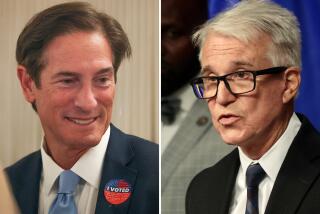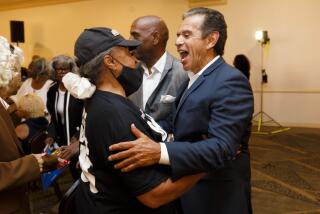Hahn Is the Trailer in This Sequel
The May 17 runoff will feature the same two men who squared off four years ago for the Los Angeles mayor’s office, but don’t expect “Hahn vs. Villaraigosa: The Sequel” to be a replay of the 2001 race, political analysts said.
Mayor James K. Hahn enters the race a wounded incumbent, having won just a quarter of the votes amid widespread dissatisfaction with his administration.
Councilman Antonio Villaraigosa goes into their rematch with a newfound willingness to respond to hard-hitting campaign tactics and deeper support from constituencies across the city than he had four years ago.
Their altered standings put Hahn at a distinct disadvantage, political experts agreed.
“It’s very, very rare that we have an incumbent that scores this far below 50% and gets the majority in the runoff,” said Republican strategist Arnold Steinberg, who advised Richard Riordan on his two successful mayoral campaigns.
But Steinberg said that he is not counting Hahn out, noting the mayor’s history of demonstrating renewed energy and focus near the end of a tough race.
“He may be one of those people who shines when he’s in the most competitive environment and he’s up against the wall,” he said.
After shoring up their bases in the first round of the election, Hahn and Villaraigosa will now pivot and try to woo the 43% of voters who backed other candidates Tuesday, particularly whites, Republicans and independents who supported Sherman Oaks attorney Bob Hertzberg and African Americans who voted for Councilman Bernard C. Parks.
It will not be an easy task for Hahn because 78% of Hertzberg supporters and 68% of Parks supporters have an unfavorable impression of the mayor, according to a Times exit poll of Tuesday’s voters.
Advisors say Villaraigosa plans to emphasize his energetic personality and reputation as a coalition-builder, much as he did four years ago.
But this time, he also will draw sharp contrasts with Hahn’s leadership style, arguing that the mayor’s low-key approach has proved inadequate to address the city’s needs.
In addition, he will highlight a continuing criminal investigation into city contracting, aides said.
“The central argument is that Antonio Villaraigosa can provide hands-on leadership to get things done in the city that the incumbent mayor has not accomplished,” said Ace Smith, his campaign manager. “Any progress he could make is stymied by the fact that his administration is paralyzed by a corruption scandal. Jimmy just doesn’t have the vision or the energy to be anything more than a bureaucrat.”
For his part, Hahn plans to focus on a somewhat different argument than he used in 2001, when he cast Villaraigosa as a risky liberal. This year, advisors said, the mayor will use Villaraigosa’s Assembly terms and his recent service on the council to argue that his rival’s accomplishments do not match his lofty promises. Hahn is also expected to pursue a line of attack he used in the first round this year, when he tagged the former Assembly speaker a “Sacramento politician” who favored moneyed interests.
“There’s a lot more evidence now of his leadership in Sacramento being a catalyst for a lot of problems,” said Hahn strategist Bill Carrick.
“Antonio has a tendency to talk in vague generalities about what he’s going to do, and I think we’re going to have to make a really strong case about how you’ve got to have some substance, not just the rhetoric,” he said.
Both candidates may have to contend with one shared dilemma: the likelihood of low voter interest in a race that feels like a repeat, analysts said.
As UCLA political scientist Frank Gilliam put it: “We’ve seen that movie before.”
As always, the race boils down to the tactical challenge of getting a majority of the vote.
Hahn must restore his standing among the white San Fernando Valley residents and African Americans who voted for him in 2001 but have since grown disenchanted with his administration. A majority of voters overall view Hahn unfavorably, while about seven in 10 have a favorable impression of his challenger. That dynamic could blunt the impact of any attacks the mayor plans to unleash at Villaraigosa, analysts said.
“The public will be less receptive, both because they know and like Villaraigosa a lot better than they did four years ago and they know and dislike Hahn much more than they did four years ago,” said Democratic strategist Roy Behr, who is not involved in the race.
In particular, black voters -- who made up 16% of the electorate Tuesday -- could determine the mayor’s fate. The vast majority supported Hahn in 2001, then largely abandoned him Tuesday, still fuming about his opposition to a second term as police chief for Parks.
Some analysts believe Villaraigosa, who received 15% of the black vote Tuesday, will fare better among those voters this spring -- especially if Parks were to endorse the councilman.
“Villaraigosa has a chance to break through,” said Raphael Sonenshein, a political science professor at Cal State Fullerton who consulted on The Times exit poll.
But others argue that a lack of enthusiasm for Hahn and persistent anxiety about growing Latino political power will keep many blacks at home, despite the fact that their vote could be pivotal.
“The notion that you’re going to be a fulcrum or change the race is a hard one to sell,” Gilliam said.
Still, the mayor plans to continue his aggressive effort to win back black support, one he began in the weeks leading up to Tuesday’s vote with visits to African American churches and South Los Angeles neighborhoods.
Hahn will also move quickly to reclaim the Valley voters and conservatives who defected to Hertzberg. To do so, the mayor, who cast Villaraigosa as soft on crime in 2001, has already pursued similar lines of attack this year.
“He’s going to run as the law-and-order, right-of-center candidate in the vote-rich Valley,” said Jaime Regalado, executive director of the Edmund G. “Pat” Brown Institute of Public Affairs at Cal State Los Angeles.
Complicating matters for the mayor, however, is the criminal investigation of city contracting, which has generated headlines about the subpoenaing of his e-mails and the resignations of Hahn aides and commissioners -- all highlighted in a Villaraigosa television ad that began running late last week.
For the last two months, Hahn’s rivals have repeatedly suggested that his administration is corrupt.
The attacks -- and the fact that four challengers were making them simultaneously -- have taken a toll on his public image.
“Any time an incumbent is forced into a runoff, he always comes in as the underdog,” said Republican political consultant Allan Hoffenblum. “But it doesn’t mean he can’t come back.”
To counter Hahn’s offensive, Villaraigosa must persuade moderate whites that he best represents their interests, despite his left-of-center reputation.
“His challenge is to have his personal, affable, collaborative style trump some of his policy positions that Hahn may attack,” Steinberg said.
But the mayor’s team scoffed at the notion that Villaraigosa’s persona could carry his bid.
“People who run on charisma really don’t go very far,” Carrick said. “Campaigns usually end up being about more than whether you have a good personality.”
*
(BEGIN TEXT OF INFOBOX)
Rematch
The percentage of votes cast for James K. Hahn and Antonio Villaraigosa on Tuesday resembles the outcome of their matchup in the April 2001 election.
*--* Election Hahn Villaraigosa 2005* 24% 33% 2001 25 2001 runoff 54% 46%
*--*
*Unofficial preliminary results
Source: Los Angeles City Clerk
--
Times staff writer Michael Finnegan contributed to this report.
More to Read
Sign up for Essential California
The most important California stories and recommendations in your inbox every morning.
You may occasionally receive promotional content from the Los Angeles Times.








